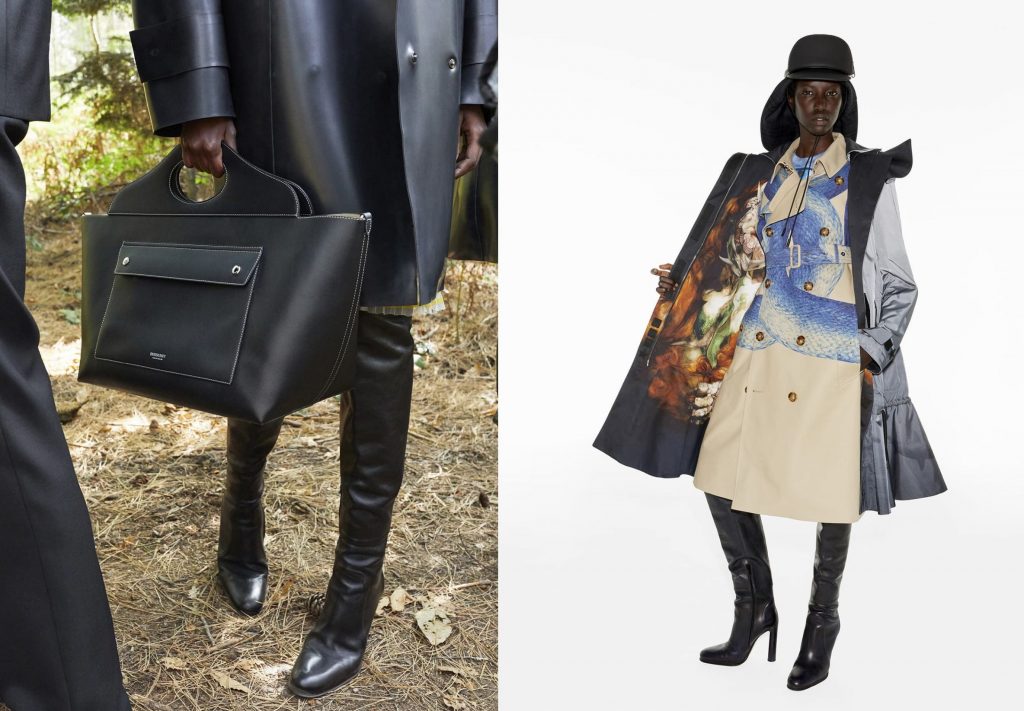Burberry bags are in the crosshairs of an Italian police probe after a number of individuals have come under the microscope for allegedly exploiting immigrant laborers in connection with the manufacturing of handbags for the British brand. Citing a statement from authorities in Florence, Italy, Reuters reported on Thursday that “two Chinese nationals were arrested on Wednesday as part of an investigation into alleged labor exploitation and tax fraud” as tied to a leather goods company that served as a subcontractor to an official Burberry supplier and that was allegedly forcing laborers from China, Pakistan and Bangladesh to work “up to 14 hours a day for just over 3 euros an hour.” Two other individuals linked to the operation have been prohibited from leaving Italy in light of the ongoing investigation.
According to Italian authorities, Samipell Srl, the company at the heart of the Italian probe, was acting as a subcontractor to Florence-based Tivoli Group Spa, an official supplier to London-based Burberry. “The arrest warrant includes a transcript of a wiretapped phone conversation in which one of the Chinese people under investigation is quoted as telling a Tivoli employee that, if needed, he will make workers toil through the night to dye small ‘Title’ bags, a type of Burberry handbag, which sells for around 1,500 euros ($1,830),” Reuters reported. Burberry has not been officially implicated in the matter, as it is almost certainly out of the loop due to the nature and logistics of a traditional contractor-subcontractor scenario.
Giuseppe Creazzo, Prosecutor of the Republic of Florence, stated during a conference on Wednesday that the Burberry-related arrests are the latest in a larger push to put a stop to “labor exploitation and irregular work contracts” in Florence, which is home to “hundreds of textile and leather goods artisan workshops,” many of which play host to the manufacturing of products for luxury goods brands. More than that, the latest crackdowns shed light on the enduring and rampant use of subcontracting arrangements (i.e., ones in which manufacturers subcontract certain production processes to other factories and workplaces, without informing the buyer) in the fashion industry, with formal suppliers even in the upper echelon of the fashion industry looking beyond the scope of the supply chain to turn around products in accordance with often sped-up timelines and demands for cost-cutting.
“In order to meet tight deadlines and/or to be able to complete unanticipated orders,” manufacturers have been known to quietly subcontract production to parties outside of fashion brands’ formal supply chains, making it so that the subcontractors are beyond the purview of the buyer. “The enormous pressure on cutting costs and fast delivery, coupled with volatile relationships in the garment industry, has led to increasing levels of unauthorized subcontracting in production,” the Centre for Research on Multinational Corporations has stated, noting that “if it is commercially attractive to subcontract orders out to cheaper workshops, manufacturers will often do so” regardless of the terms of their agreements with brands, most (if not all) of which specifically – and explicitly – prohibit the use of subcontractor labor.
These subcontracting practices have made headlines in the fashion space for years, with Dolce & Gabbana, Gucci and Prada, for instance, facing against intense scrutiny over claims about the manufacturing of their products back in 2007, following the release of “Luxury Slaves,” a broadcast by “Report,” a 60 Minutes-style program on RAI-3, an Italian state channel, which detailed the conditions in which luxury brands’ “Made in Italy” products were allegedly being made. In February 2008, a lengthy article from the Los Angeles Times, entitled, “Slaving in the Lap of Luxury,” declared, “There are products made completely in Italy but by Chinese immigrants without proper documents and [for whom] labor conditions are especially nasty.” One of the core claims at play was that Italian labor laws were being flouted. For instance, although the minimum wage in Italy was more than $10 an hour at the time, most of the individual laborers referenced in the RAI-3 investigation were being paid less than $5.
A decade later, in April 2018, the New Yorker’s D.T. Max revived the conversation, shedding light on the continuing practice of suppliers to big-name fashion and luxury brands relying on the same hordes of immigrants from Wenzhou, China that flooded Italy’s Tuscan region in the 1990s “to create accessories and expensive handbags that bear the coveted ‘Made in Italy’ label.” And still yet, in November 2019, Armani, Saint Laurent and Fendi were among the luxury brands being forced to investigate their supply chains after the owner of a factory in the suburbs of Naples, Italy was arrested for employing “dozens of undocumented workers” to make leather goods for some of Europe’s best-known luxury groups.
As for Burberry, the brand – which announced on Thursday its aim to become climate positive by 2040, going further than its earlier target to be net-zero within the next 19 years – is in the midst of a large-scale revamp that has been underway since 2017 under the watch of CEO Marco Gobbetti, who aims to cement the 165-year-old fashion company in the luxury realm alongside the likes of LVMH and Kering-owned brands.













